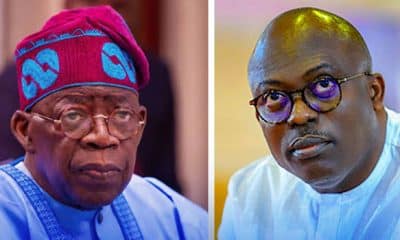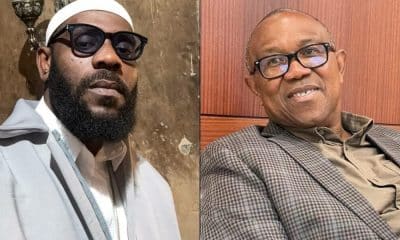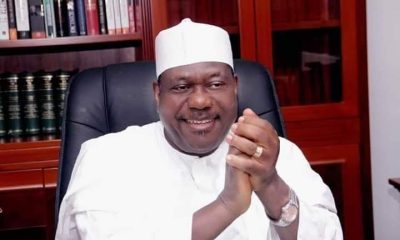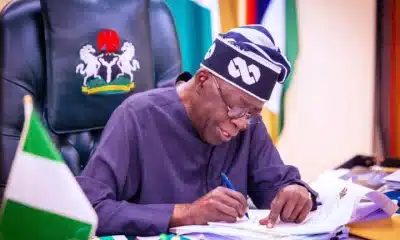Nigeria News
Tinubu Asks Tribunal To Dismiss Peter Obi’s Petition, Probe States LP Won
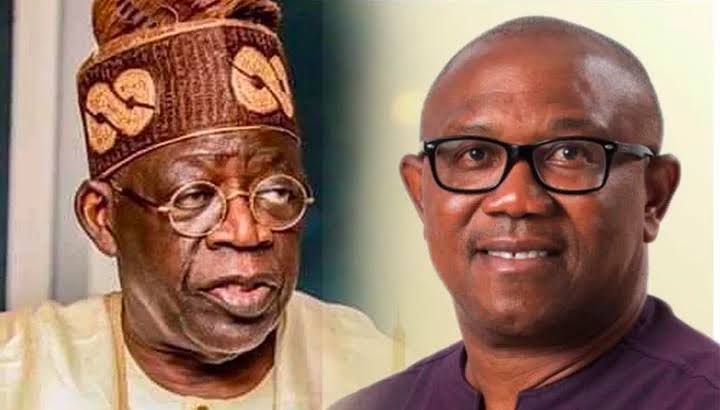
The President-elect, Bola Tinubu, has urged the Presidential Election Petition Tribunal to dismiss the petition the Labour Party (LP) and its candidate, Peter Obi, filed to nullify his election.
In the preliminary objection he filed through his team of lawyers led by Wole Olanipekun (SAN), the President-elect also asked the Appeal Court to also probe election results from states the LP won.
In the objection he filed alongside his Vice-President-elect, Senator Kashim Shettima, Tinubu maintained that Obi was bereft of the locus standing to file a petition to challenge his election victory, arguing that the LP candidate was not validly nominated to contest the presidential election in line with the mandatory provisions of sections 77(2) and (3) of the Electoral Act, 2022.
According to the former Lagos State governor, Peter Obi’s name was not found on the register of members of the LP, noting that he defected to the party from the Peoples Democratic Party (PDP) less than 30 days before the primary election that produced him as a presidential candidate, was conducted.
Tinubu told the tribunal that he is qualified to run for President as he is a holder of a Degree of Bachelor of Science in Business and Administration from the Chicago State University since 1979.
He added that he has vast private and public sector work experience, including working with Mobil Oil Nigeria as an auditor and later company treasurer.
The preliminary objection read: “In a bid to actualize his quest for public service, left his lucrative and secure employment in Mobil Oil Nigeria, and forayed into active politics, as a founding member of the defunct Social Democratic Party (SDP).
“In 1992, he was elected by an overwhelming majority of lawful votes cast as a Senator of the Federal Republic Nigeria, representing Lagos West Senatorial District.
“The votes secured by the 2nd respondent at the time were the highest scored by any senatorial candidate in the entire country.
“As a Senator of the Federal Republic of Nigeria, he distinguished himself as the Chairman of the Senate Committee on Banking, Finance, Appropriation and Currency.
“Following the annulment of June 12, 1993, Nigerian presidential election and the consequent fresh militarization
of the Nigerian political leadership, which terminated the structures of elective governance in that Republic, he became a founding member of the notable pan-Nigerian pro-democracy group, the National Democratic Coalition (NADECO) where he was at the forefront of advocacy for a return to democratic governance and the fight against military rule.
“During the period in (viii) above (popularly referred to as the dark days of Nigeria’s military era because of human rights abuses and a clampdown on pro-democracy advocates), he suffered many arrests, intimidations, threats, search and violation of premises, which ultimately eventuated his proceeding on exile out of Nigeria.
“Many pro-democracy activists suffered wanton attacks including death suspected to have been state-sponsored in the said dark days and it was commonplace that a number of them proceeded on exile and together with the 2nd respondent, they continued to mount international pressure for the return of democratic rule to Nigeria. These pressures eventually yielded positive result in 1999 with the return of democratic rule to Nigeria by the birthing of the 4th republic which is currently running and in which period, the 2nd respondent has been a constant and prominent feature.
“Preparatory to the return of Nigeria to democratic governance and commencement of the 4th republic, the 2nd respondent returned to Nigeria from exile and became one of the founding members of the Alliance for Democracy, on which platform he was successively and overwhelmingly elected by the people of one of the most populous states in Nigeria, Lagos State, as the Executive Governor of the State for two terms of four years each in 1999 and 2003.
“As a result of his outstanding performance as an executive Governor of Lagos State, he won various national and international awards and recognitions from reputable organizations, such as the Nigerian-Belgian Chamber of Commerce; Federal Ministry of Works and the United Nations Habitat Group; as well as the Computer Association of Nigeria.
“In recognition of his stellar contributions to governance, humanity, educational development and nation-building, he has received several honorary academic awards from various notable academic institutions.
“Was/is a founding member of the 4th respondent which, in its first national election after formation, ended the 16-year cycle of the Peoples Democratic Party at the helm of affairs in Nigeria.”
“The respondents shall further contend that the petitioners have embarked on a wild goose chase in the presentation of this petition and, in the process, are questioning results of elections where the respondents lost, including where the petitioners were declared winners, as exemplified in paragraph 73 of the petition where petitioners were querying results of Lagos, Imo and Plateau where they won, as well as Taraba, Adamawa, Bauchi and Kaduna where PDP won.
“The respondents contend that the entirety of the petition is about guesswork, hype, speculation and conjecture, as there is nowhere in the entirety of the petition, where the petitioners have specified in any form howsoever, the number of their votes which have been affected by irregularities which they bandy and what their total number of votes would have been on the one hand, and the number of the respondents’ votes that have been inflated by the much-touted allegations of noncompliance/corrupt practices and what the votes of the respondents would have been on the other hand.
“In terms of national acceptance of the 2nd respondent as a political figure, titan and maestro on the one hand, and that of the 1st petitioner on the other hand, the 2nd respondent is far ahead of the 1st petitioner in every sphere and index, and this is clearly known to Nigerians and also demonstrated by the result of the election.
“Further to paragraph 103 supra, in terms of structures, stability, national spread, political office holders who have won elections, either at the national level or State and Local Government levels, as well as national acceptability/spread, the 2nd petitioner trails the 3rd respondent far behind and this is equally well known to the electorate and the petitioners themselves.
“Further to paragraphs 103 and 104 supra, while the 2nd and 3rd respondents scored not less than 25% of the votes cast in 29 States, cutting across the different geo-political zones, the petitioners only managed to score 25% in 16 States, in restricted geo-political zones,” Tinubu added.

